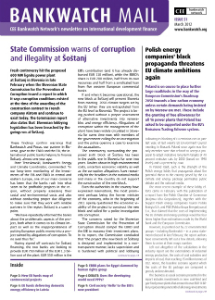Letter to EBRD and EIB: Will a loan to ENEA free up assets for a coal fired power plant in Poland?
Publication | 22 March, 2012The EBRD and the EIB are considering a loan of up to PLN 800 million to the Polish electricity utility ENEA to support a PLN 3.2 billion investment programme of the company’s distribution network. Bankwatch’s letter enquires what conditions will be placed on an EBRD loan to ENEA to make sure that the loan does not free the company’s assets that it needs to invest in the Kozienice coal-fired unit number 11 in Poland. A similar letter was sent to both the European Bank for Reconstruction and Development (pdf) and the European Investment Bank (pdf).
Read moreEIB lending figures in 2011: Germany 6 – Greece 1
Publication | 13 March, 2012For a bank tasked to contribute to the ‘balanced and steady’ development of the internal market in the interest of the EU, the EIB’s figures for its financing operations in 2011 (released last month at its annual press conference) induced a certain amount of head-scratching here at Bankwatch Mail.
Read moreA civil society ‘Hello’ to the EIB’s new president
Publication | 13 March, 2012The ‘Counter Balance: Challenging the EIB’ coalition has written to Werner Hoyer, the new president of the EIB, welcoming him to his new post. Hoyer, formerly state secretary in Germany’s foreign office and a member of the Free Democrats, the junior partner in Chancellor Angela Merkel’s government, becomes the EIB’s seventh president, succeeding Philippe Maystadt.
Read moreEIB’s clean energy credentials continue to be compromised, policy review offers clean break from fossil fuels
Publication | 13 March, 2012‘Carbon Rising’, a new study from Bankwatch, catalogues the EIB’s energy lending for the period 2007-2010 during which time the bank loaned EUR 40 billion to energy projects across the EU and EUR 8 billion outside the EU. This lending was guided by the EIB’s first energy policy ‘Clean Energy for Europe: A Reinforced EIB Contribution’, adopted by the bank in 2007.
Read moreState Commission warns of corruption and illegality at Šoštanj
Publication | 13 March, 2012Fresh controversy hit the proposed 600 MW lignite power plant at Šoštanj in Slovenia in late February when the Slovenian State Commission for the Prevention of Corruption issued a report in which it says corruption conditions existed at the time of the awarding of the construction contract to French company Alstom and continue to exist today. The Commission report also states that Slovenian lobbying legislation has been breached by the goings-on at Šoštanj.
Read moreLetters to EBRD and EIB: Irregularities in the Sostanj project in Slovenia
Publication | 13 March, 2012With this letter, Bankwatch, together with Focus, Association for Sustainable Development and Greenpeace Slovenia are informing the EIB’s and EBRD’s highest decision-making bodies about recent developments in the case of the Sostanj lignite power plant that in our view should prompt the banks to drop their participation in this investment. The EBRD’s president Thomas Mirow replied on April 16, 2012 (download his response (pdf)) informing us about the suspension of the EBRD’s loan for the Sostanj project. Just one day later, another letter from the EBRD (download as pdf) informed us that the suspension is not a formal suspension.
Read moreWelcoming letter to the new EIB president
Publication | 12 March, 2012The Counter Balance EIB coalition has welcomed Werner Hoyer, the new president of the EIB, to his new post.
Read moreCOGEN Slovakia, Cogeneration in Povazsky Chlmec
Publication | 7 March, 2012The new greenfield gas cogeneration power plant COGEN in north Slovakia is planned to produce power and heat. Located in Považský Chlmec, a town in the Žilina district, the new plant would further deteriorate the quality of life of locals, who have for decades been suffering from the negative impacts of a nearby waste disposal site and nearby highway.
Read moreEnergy Security for whom? For what?
Blog entry | 28 February, 2012A new report by The Corner House critically examines the notion of “energy security,” one of the buzzwords in European politics used to justify controversial infrastructure projects like the Nabucco gas pipeline or high voltage transmission lines in Ukraine. Here an introduction to the report from its authors.
Read moreThe dirty French-Slovenian connection
Press release | 23 February, 2012Slovenian state anti-corruption body claims ALSTOM could have benefited from corrupt acts to get deal to build new lignite plant at Sostanj.
Read more

